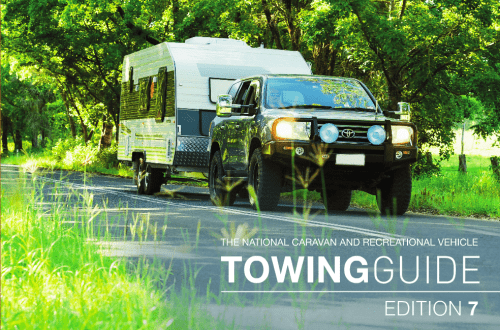Apart from adding to the driver’s legal responsibilities, towing a trailer of any discipline requires a greater degree of knowledge and skill. All trailers including caravans, camper trailers, 5th wheelers and tent trailers effect the performance of the towing vehicle. They effect fuel consumption, acceleration, braking ability, general control and manoeuvrability.
These effects can increase depending on the size and weight of the trailer increase relative to that of the towing vehicle. The extra length and width can be hard to manage, with wind, road conditions and passing vehicles having a greater effect than on the vehicle alone. This places additional responsibilities on the driver.
When towing you should:
- Be aware that towing is more stressful than normal driving and is more likely to cause fatigue. Therefore, more rest stops should be
- Allow for the extra length and width of the trailer when entering
- Avoid sudden lane changes and changes of dir
- Ensure that you do not have people riding in the trailer or caravan. This is not permitted by law.
- When travelling downhill engage a lower gear in both manual and automatic vehicles to increase vehicle control and reduce brake
- Pay particular attention when accelerating and braking, especially when approaching corners.
- Leave more distance than usual between yourself and the vehicle in front.
- Allow more time and distance when overtaking other road users and ensure you are well past them before moving back to the left hand side of the road again.
- Where possible, pull over regularly to allow following vehicles to overtake and keep left to give overtaking vehicles as much space as possible.
- Be careful when driving in poor conditions or in high winds, as their impacts are magnified when towing a caravan.
- Apply the accelerator, brakes and steering smoothly and gently to avoid sway, especially in wet or slippery conditions.
- When reversing it is advisable to have someone outside the vehicle helping with dir
- If your caravan begins to sway or snake, remain calm and avoid the urge to apply the towing vehicle’s brakes. Don’t try to steer out of the swaying /snaking, alternatively hold the vehicle steady and try to stay in the lane. Gently apply the caravan’s electric brakes using the manual control. Otherwise, where conditions permit, continue at a steady speed or accelerate slightly until the sway
- When the swaying has been corrected, slow down and pull off the road safely. Check that your load is correctly distributed and ensure that heavier items are placed over the axles of the caravan. A caravan that doesn’t have the load distributed correctly may not handle well and may be the cause of swaying/snaking.
- To reduce sway, heavy loads should be concentrated towards the centre of the trailer. It is important to not overload your trailer and you should not exceed the maximum load specified or recommended by the trailer manufacturer.
- Load equalisers can be used when towing and help the vehicle to retain normal suspension height and effective steering control. They also help to transfer some of the weight from the towbar to the front and rear suspension of the
- As reversing with a caravan is difficult, where possible drive out forward from a parking spot. When practicing reversing, ensure it is done in a safe environment and have someone to guide you.
Who can tow?
You only need a standard driver’s licence to tow a caravan and some upper levels of probationary licenced drivers can also tow caravans. Some lower levels of probationary licences cannot tow caravans or trailers unless it is for work and at the request of an employer; or if an experienced driver is sitting beside him/her and a ‘driver under instruction’ plate is attached to the front and rear of the vehicle. In all states and territories learner drivers are not permitted to tow either caravans or trailers.
Further regulations also prevent:
- anything additional being towed behind the caravan;
- anyone riding in the caravan while it’s in motion;
- towbar equipment obstructing the vehicle number plate when the caravan has been disconnected.
If you are travelling interstate with your caravan or trailer remember to check individual State or jurisdiction regulations with the relevant authority, before you leave.
More Information
For more information, please refer to our National Caravan and Recreational Vehicle Towing Guide.




